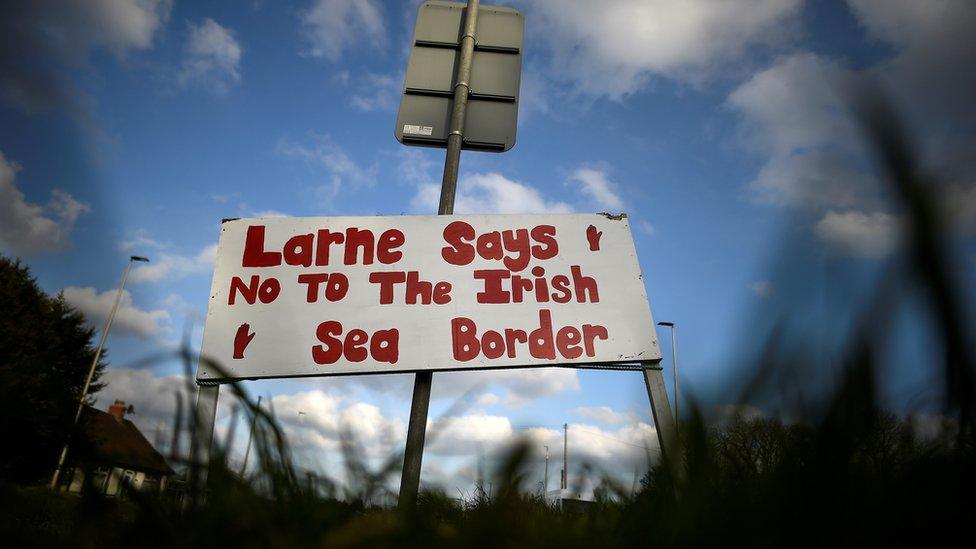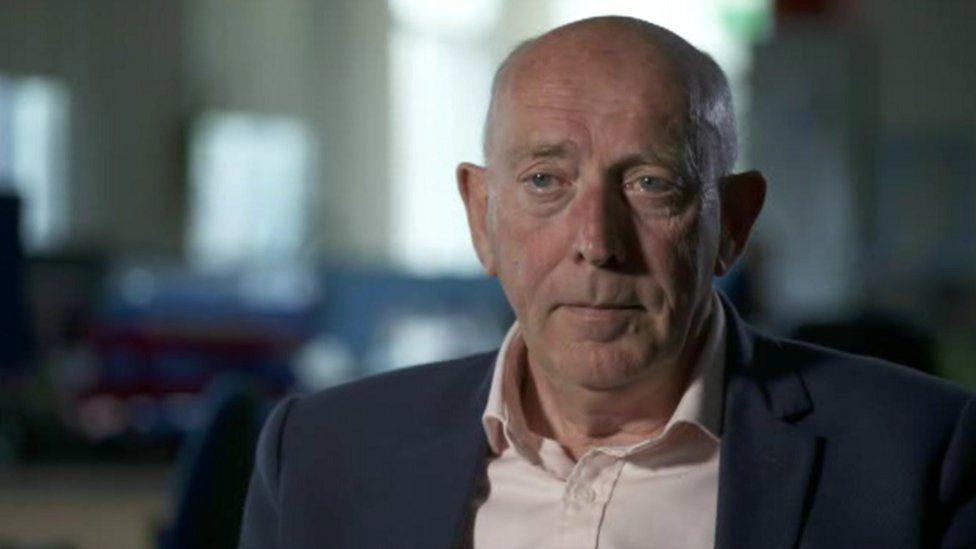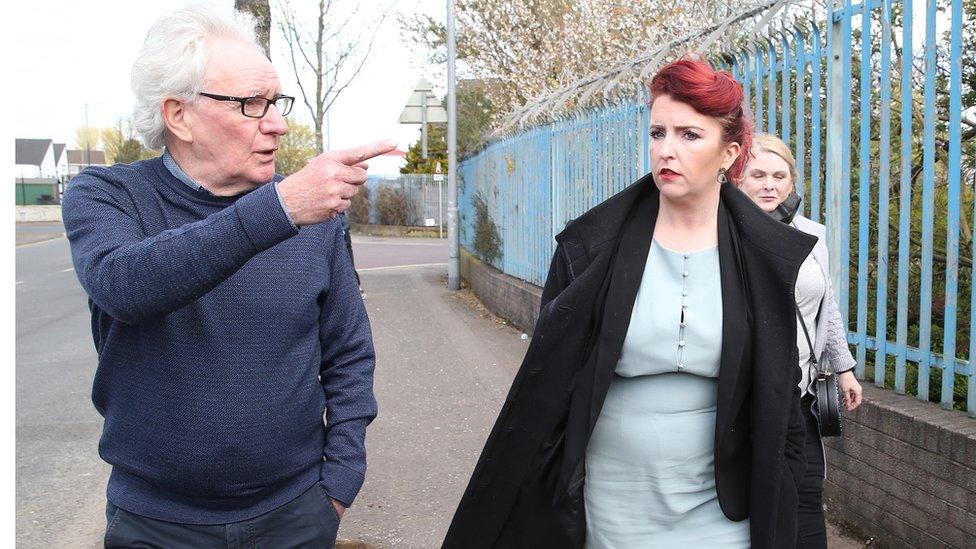NI Protocol: 'Nobody is stirring up or provoking violence', says PUP
- Published

John Kyle said he was not aware of people talking up violence over the NI Protocol
A unionist councillor has said he is unaware of people stirring up, provoking or suggesting violence over opposition to the NI Protocol.
But given NI's contested and conflicted history, it would be naive to rule it out, Progressive Unionist Party (PUP) deputy leader John Kyle told MPs.
The PUP has long been acknowledged as the political wing of the UVF.
The protocol is the part of the Brexit deal that created a border in the Irish Sea.
Mr Kyle's comments to the Northern Ireland Affairs Committee come after the Loyalist Communities Council (LCC) - which has representatives from paramilitary groups such as the Ulster Volunteer Force (UVF) and Ulster Defence Association (UDA) on it - told MPs at the same committee last week that violence is "an absolute last resort" in opposing the protocol.
One of its members, 19-year-old Joel Keys, said he would not rule violence "off the table".
Belfast city councillor Mr Kyle told MPs on Wednesday: "I am not aware of people stirring up or provoking violence or suggesting to people that they should consider violence.
"I am not aware of people talking that up."
But he added: "Given our contested, conflicted and difficult history … I think it would be naive to rule it out. We do need to be cognisant of the possibility that things could become violent."
Mr Kyle added people were working to avoid and discourage violence. He said violence was wrong, counterproductive and was damaging to the fabric of society.
"It inflicts misery and drives us back to the past," he said, adding that he was not aware of there being "any imminent threat towards violence".

The Northern Ireland Protocol is opposed by unionist parties in Northern Ireland
He said the protocol had polarised people and where polarisation occurs, people become "tribal".
"That always raises the possibility of disagreement bubbling over into some sort of confrontation," he said.
The evidence session comes more than a month after rioting erupted in some loyalist areas - with tensions around the Northern Ireland Protocol partly blamed.
Mr Kyle said people who lived through the Troubles did not want to relive that, but the younger generation holds strong views.
Mr Kyle said most unionists felt the protocol had been imposed on them without asking for their consent and that the UK government needed to do more to understand their concerns.
He said there was a sense of betrayal.
He added that the "identity and ethos of the unionist community was sacrificed" for Brexit and that the nature of their citizenship had changed, without consent.
Asked about the possibility of economic benefits from the protocol, Mr Kyle said: "For many unionists, being British is more important than being prosperous."
He also said that the LCC's withdrawal of support for the Good Friday Agreement was "an attempt to express how profoundly disturbed members of the loyalist community were at the imposition of the Northern Ireland Protocol".

Peter Sheridan of Co-operation Ireland said violence had "acheived nothing"
He added that Northern Ireland had moved backwards in terms of community relations and in terms of the relationship with the Republic of Ireland.
Peter Sheridan, the head of Co-operation Ireland, told the committee that as a former policeman of 32 years experience, "violence achieved nothing other than death and destruction".
"For unionism, what will secure the future of Northern Ireland is that this place is made to work," Mr Sheridan said.
"People will make judgements [in a border poll] based on where they feel secure. Trashing the place through violence is not going to improve that situation."
Later, community worker Jackie Redpath from the Shankill area of Belfast told the House of Lords sub committee on the NI Protocol that there had been a change in working class communities in both tone and attitude towards the peace process.
Mr Redpath, of the Greater Shankill Partnership, said the peace process would not be "freely discussed in a positive way in places like the Shankill".
Mr Redpath said he believed the protocol has had a "negative impact" on the peace process.
"That is the most serious implication for me of what's happening with the protocol at the moment, in terms of the peace process, in terms of attitudes to devolution which now are much more negative and towards the Belfast/Good Friday Agreement," Mr Redpath said.

Shankill community worker Jackie Redpath (left) speaks to Shadow NI Secretary Louise Haigh during her visit to Belfast in April
Mr Redpath said Northern Ireland was "sacrificed, either knowingly or unknowingly, as collateral damage" to allow for the Northern Ireland Protocol.
He said the situation was currently "frozen", with no improvement or deterioration.
Mr Redpath told peers the violence on the streets of Northern Ireland in April - including at the Lanark Way interface in the Shankill area - paused because of the death of the Duke of Edinburgh.
"I dread to think what would have happened had that gap not happened. Because the build-up of anger I fear would have spilled into that weekend and beyond," he added.
He said the language used by the EU when talking about the protocol sounds as if they are "putting it up" to loyalism.
"We are in a very delicate situation that needs looked after," he added.